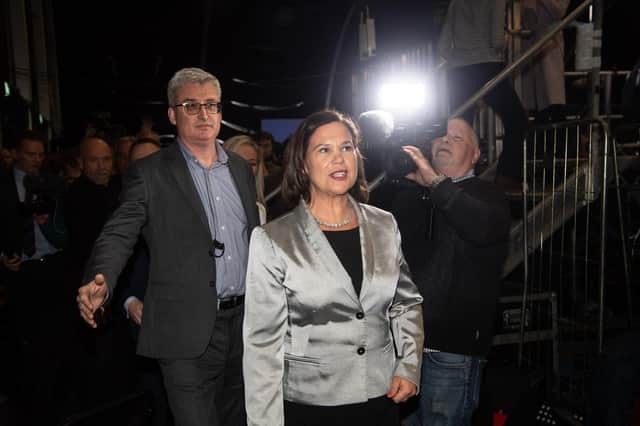Cillian McGrattan: If rewriting the past can be done within living memory of the IRA's crimes in Northern Ireland, think how easy it will be for Sinn Fein in the Republic


Though it is still by far the largest party in those polls – holding a consistent ten-point lead over the returns of Fianna Fail and Fine Gael – it has fallen from a high of 37 points in October 2022 to 31 in February 2023. The party’s electoral breakthroughs have put it in pole position to form the next government in Dublin – perhaps with the help of the Greens – in 2025.
It remains an incredibly elitist organisation with all the hallmarks of fascist politics: Strictly hierarchical in structure and the allocation of power and foreclosing of voice and democratic debate. The key idea remains the Mussolini Strength through Unity, where the military ethos of zero internal opposition and passive persistence are unquestioned.
Advertisement
Hide AdAdvertisement
Hide AdAs a recent report in the Irish Times made clear, its ruling cadre remains dominated by party officials who were either in or were close to the IRA: ‘little has changed in the way Sinn Féin is run under [Mary-Lou] McDonald than in days of [Gerry] Adams and Martin McGuinness’.


The party is continuing to import other techniques and tactics it first developed in Northern Ireland into the South to colonise the ideological landscape of the Republic’s politics.
Some commentators, historically hostile to the republican movement and its historical revisionism, such as Fintan O’Toole, have picked up on aspects of that strategy – particularly, when it blatantly pertains to the sectarian dimensions of the IRA’s campaign in Northern Ireland as they are reproduced and minimise in insipid ‘rebel songs’.
The triumphalism of nationalists North and South of the border is only the most obvious characteristic of that colonisation project. Because Sinn Fein is drawing on its lessons of rewriting the past in Northern Ireland to attempt to disarticulate the constitutional nationalist state ideology in the South just as it has tried to do to unionist collective memory in the North.
Advertisement
Hide AdAdvertisement
Hide AdAt first glance the tactics might appear ridiculous: The highlight of a recent centennial commemoration of the deaths of two republicans in Co Cork was a Sinn Fein-organised parade of people dressed in ‘paramilitary uniforms’ – transcribing the Provisional IRA back in time. Given how seriously republicans remember the hunger strikes by parading half-naked, dressed as blanketmen it would be a mistake to write this off as only absurd.
This politics of equivalence involves creating historical parallels between the Northern, Provisional IRA of the post-1970 period with the movement that fought for independence and split over the Treaty of December 1920 in which republican negotiators, including Michael Collins, agreed to partition and to forgo an independent republic
A key example of that parallelism is the decision to rename the Ennis Sinn Fein branch, the ‘Peadar Clancy Mairéad Farrell Cumann’ – bringing together a republican killed while in custody in 1920 with a bomber who was shot while trying to plant a bomb in Gibraltar by the SAS in 1986. The renaming has been challenged by the Fianna Fail TD, Cathal Crowe, who is a descendant of Clancy, on the pages of the Clare Echo: ‘Trying to equate the two people is, frankly, an insult to Peadar and barefaced historical revisionism’
Famously, George Orwell, a long-term student of fascism, wrote that to control the past meant to control the future, and Sinn Fein’s Southern revisionist project is neither simply about elections nor rewriting the history of Provisional IRA atrocities.
Advertisement
Hide AdAdvertisement
Hide AdIt is aimed at hollowing out the collective memory of the constitutional nationalist tradition that has served as the main foundation of Irish politics for a century – and replacing it with the physical force tradition of the justifiability of violence and blood sacrifice for the cause of Irish unity.
Regardless of whether one agrees with the constitutional nationalist narrative (also draws on ahistorical mythmaking), that the republican revisionist project is now being rolled out in the South is troubling for all democrats.
As this paper has consistently pointed out, the republican narrative about the conflict has been largely accepted across Northern nationalism and large swathes of the British political classes.
The historical record ought to shame republicans – a sordid series of assassinations, car bombs, child abuse cover ups, and responsibility for the vast majority of the killings and violence.
Advertisement
Hide AdAdvertisement
Hide AdInstead, it is glorified and commemorated on an industrial scale. If that rewriting of the past can be done within living memory of the crimes in Northern Ireland, how easy will it be for Sinn Fein to inscribe its narrative on the Republic’s collective memory?
• Cillian McGrattan lectures in Politics at Ulster University